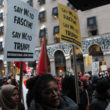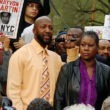THIRTY-FIVE. THAT’S THE NUMBER OF TIMES Charles McLaurin was arrested between 1961 and 1965. McLaurin said he beat the odds because he was badly beaten only once, when he and four friends were stopped by a highway patrolman in August 1964, near the Alabama state line. They were traveling to a Student Non-Violent Coordinating Committee (SNCC) meeting in Atlanta. Each of the five young men was individually interrogated and subjected to a brutal beating. They were released after spending the night in jail. The driver of the car, James Black, was issued a traffic citation.
McLaurin said that a number of his arrests didn’t involve organized acts of protest, but rather, principled responses to the workaday humiliations that white Mississippi inflicted on its black citizens. He is one of the “local people” John Dittmer describes in his book by that title. In Local People, Dittmer wrote about black Mississippians who put their lives on the line in the struggle for voting rights in the Mississippi Delta between 1961 and 1965.
Sitting in the lobby of the Blues Traveler Best Western Hotel in Indianola, McLaurin reminded me that the Delta—the twelve counties closest to the Mississippi River between Memphis and Vicksburg—was another country when he made the hundred-mile drive north from Jackson in 1962.
It’s sobering to recall just how different that country was then. McLaurin described SNCC workers helping young black men escape from plantations at a time when anyone who owed money to a plantation owner was not allowed to leave.
“A lot of blacks stole away from the plantation,” McLaurin said. “We gave people bus ticket money. Instead of catching the regular bus at the bus station, we stopped the bus on the highway and put them on. Sometime we would be on our way to Memphis and we would take a young person with us so he could catch a bus to Chicago. The parents letting that child go, they would be stained. But the child would be free.”
The SNCC workers who moved into northwestern Mississippi were not hired to spirit young men out of the Delta. At the age of twenty-one, McLaurin went to the Delta with the specific purpose of registering voters. When he arrived in Sunflower County, in the mid-Delta, the average income of African-Americans was between $400 and $600 a year, according to Dittmer’s Local People. Blacks outnumbered whites two to one; 13,000 blacks were eligible to vote, but only 200 were registered.
McLaurin said he was naive when he told the civil rights leader Medgar Evers he would go to Sunflower County to organize a voter-registration drive. “I had told Medgar I just wanted to get Mr. Charlie off my back,” McLaurin said. When he asked Evers how they could get Mr. Charlie—the white man—off their backs, “[Evers] took out this big map and drew a big circle around the Mississippi Delta.
“And he said, ‘Here’s where we start.’
“I thought we was going to be able to come up to the Delta and register all of the black voters in about six months. And then I was going to go back to Jackson to go to school or get elected to the legislature.” Evers had directed the Mississippi NAACP for almost ten years when he was assassinated in his driveway in Jackson by a white supremacist in June 1963.
Evers’s Delta demographics made sense. Sixty-five percent of the population of Sunflower County was black; and blacks were the majority in the other Delta counties, where their labor sustained a plantation economy that, except for manumission, had changed little since the Civil War. When McLaurin showed up for work in Ruleville in 1962, Democratic Senator James Eastland’s family owned one of the largest plantations in the county. Economic power was defended by elected and appointed officials, all Democrats in a one-party state. On McLaurin’s first day as an organizer, as he left the house where he was staying, Ruleville’s mayor, Charles Durrough, pulled up beside him, pointed a pistol at him, and told him to get into the car for a talk.
McLaurin said he got the message. Ruleville wasn’t Jackson and Mr. Charlie wasn’t going to give up power without a fight.
NIGHTMARE ON MAIN STREET—In his mid-sixties, Charles McLaurin is a short, stout man with a trim gray beard, short gray hair, large, expressive eyes, and a soft voice. Sitting in the lobby of a motel a mile from the Sunflower County courthouse in Indianola, he described his first attempt to register voters.
I had never been to Indianola before. This was my first trip from Ruleville, bringing the only three people we could get to try and make the attempt. I believe that one of those ladies was Augusta Hicks, who had made about twenty attempts before she actually got registered. The guy driving the car was Tommy Johnson. . . .
We came across the intersection of 49 and 82 and came down to Main Street and drove along the bayou. I had never seen anything like it. The bayou was beautiful, you know, with all these trees and shade and everything. And it just seemed like the drive from the highway to Sunflower Avenue was the longest drive. It was like something out of The Legend of Sleepy Hollow. At any time you was expecting the policeman to dart out from behind some building. But that didn’t happen.
The courthouse was on our left. The courthouse itself was frightening to me. We drove up to the jailhouse, across the street from the courthouse. The ladies with me got out of the car. And we walked along together. Because now, walking up to the courthouse, you are walking in harm’s way.
I had to summon everything I had ever thought about to make me be brave. We went into the courthouse. We went up to the Circuit Court clerk’s office. The clerk that time was a fella by the name of C.C. Campbell, an elderly white man, I guess about 5’11”, about six feet.
He said, ‘What you niggers want?’
I don’t know if the women was as afraid as I was, but they didn’t show it. I couldn’t show it either.
No one registered to vote that day. “We got in the car and just eased out of town,” McLaurin said. “We didn’t want to rouse nobody, to get any attention very much.”
A police car followed them to the city limits.
A RUSH TO JUDGMENT—Fifty-five days. That’s how long Hollis Watkins sat on Death Row at Parchman Penitentiary. In June 1963 Watkins was one of three SNCC field workers who, with a group of local activists, led two hundred black Mississippians to the courthouse in Greenwood to register to vote. When the group refused to disperse at noon, the local leaders and the SNCC workers were arrested. At 1:30 p.m., county officials held a “five-minute trial.” Everyone in custody was sentenced to four months of incarceration.
“I went briefly to the city jail,” Watkins said in an interview in his office in Jackson. “From there to the county penal farm, where I spent about a week. From there I was transferred to the Mississippi State Penitentiary [at Parchman], where I spent fifty-five days on death row in the maximum security unit.
“Disturbing the peace was one charge,” Watkins recalled. “They may have also had a charge of parading without a permit.”
The crimes with which Watkins was charged were irrelevant to his arrest: He was in fact arrested for trying to register black citizens to vote. And although he was not charged with any capital offense, he was locked up on death row.
For much of the time at Parchman, he was held in solitary confinement.
“It was to a great extent isolation,” Watkins said. “Because I was in a cell all by myself. If I attempted to talk loud to somebody down the hall, or if I sang freedom songs to give myself motivation, I was put in solitary confinement.
“Solitary confinement was a six-by-six cell that only had a place to get air through the small crack under the door. And there was a time when fourteen of us was placed in that six-by-six cell.”
Watkins said his incarceration was intended to send a message to anyone who might follow in his footsteps. I asked him if he anticipated the viciousness with which white Mississippi would respond when provoked.
“I knew what white Mississippians were capable of when they were unprovoked,” he said. “It depended on how they were feeling at the time, to determine whether they showed their teeth. As I saw it, just being in their presence when they were in a certain mood could be provoking.”
Watkins would later insist that all volunteers coming to Mississippi in 1964 be warned that they should be prepared for three things—”to be beaten, put in jail, and possibly killed.”
Watkins is a short, wiry, kinetic man who is quick to challenge not just a question but a particular term in a question. When I asked him if Governor Haley Barbour’s warning—that some of the state’s newly registered voters would be challenged at the polls, on November 4, and required to show identification—was low-level intimidation, Watkins took issue with the words “low level.”
“It’s definitely a form of intimidation,” he said, aimed at discouraging some of the 180,000 newly registered voters from showing up to vote. A warning that voters will be challenged at the polls, he said, will always serve to discourage some blacks who are not comfortable about confronting authority.
At 10:30 on the morning of the election, Watkins had just returned from a Jackson polling place he frequently monitors, to get some sense of voter turnout. He was predicting a black vote unlike anything Mississippi had ever seen in a presidential election. The Obama campaign, Watkins said, had attracted movement-oriented young people who reminded him of himself when he signed on with SNCC at nineteen years of age. He predicted that the kids Obama drew into the campaign will change the course of electoral politics in Mississippi. The non-profit community organization Watkins founded and directs, Southern Echo, is heavily invested in young black Mississippians.
THE ARC OF HISTORY—In a conference room across from his office at the Fannie Lou Hamer Institute at Jackson State University, Professor Leslie Burl McLemore raced through a history of the voting rights movement in which he participated as a SNCC field worker in the early sixties. He was following the arc of history from Medgar Evers’s appointment as statewide director of the NAACP in 1954 to Barack Obama’s visit to the Jackson State campus in 2008.
A tall, elegant man with white hair, McLemore is engaging, profane, and impassioned. On the day before the presidential election he was fairly leaping out of his chair. The modern civil rights movement in Mississippi, he said, began when Evers was appointed to lead the NAACP, and achieved critical mass when Bob Moses arrived in Mississippi in 1961.
So much happened in the first half of the explosive decade after Moses arrived in Mississippi to serve as SNCC’s director. Moses was a Harvard-trained teacher from Harlem, with a rare ability “to leave his ego in the next room.” His collaboration with Evers led to the voter registration project in the Delta; the Freedom Ballot Campaign of 1963, in which 83,000 blacks and a handful of liberal whites conducted their own separate statewide election; the Freedom Summer of 1964, when thousands of volunteers from out of state collaborated with Mississippi blacks to register voters; and the formation of the Mississippi Freedom Democratic Party, which challenged the state’s all-white delegation to the 1964 national Democratic Party convention in Atlantic City.
McLemore was a Freedom Party delegate at the convention at the time that Fannie Lou Hamer, a former timekeeper on a Ruleville plantation, seized the nation’s attention with her plea to seat her entire delegation and her resolve not to accept the two seats the national party had offered.
McLemore didn’t initially grasp the significance of the changes they had forced on the Democratic Party, because his vision was “clouded” by the fight over the compromise the Freedom Party refused: two seats and honored guest status for the entire Freedom delegation. The official Mississippi delegation walked out of the convention after refusing to sign a pledge to support the ticket, and the Freedom delegates ended up unofficially occupying their seats. In response to the demands of the Mississippi Freedom Democratic Party, the national Democratic Party wrote into its rules that no segregated delegation could be seated at a national convention.
“We changed the rules for the national Democratic Party convention system,” McLemore said. “And that changed the body politic of this country.”
Mostly McLemore talked about the work the SNCC workers did in Mississippi—at one time “the worst goddamned hellhole in the country”—between 1961 and 1964, and the extraordinary groundwork laid by the generation that preceded them.
McLemore riffed through a list of names not as familiar as Moses and Evers: “Susie Ruffin, the Hudson sisters over in Leake County, Cleveland Jordan in Greenwood, Medgar’s sidekick Aaron Henry, Amzie Moore, C.C. Bryant, E.W. Steptoe. . . .
“Mississippi was tough,” McLemore said. “It is still a tough place to live. But Medgar Evers and his cohorts made it possible for SNCC to do what it did in Mississippi.”
At a Senate Judiciary Committee hearing last September, Bob Moses recalled the names of the women and men who collaborated in the SNCC voter registration campaign that had begun forty-five years earlier:
Hollis Watkins and Curtis Hayes, from Summit, just North of McComb; Emma Bell from McComb; Charles McLaurin, James Jones, Jessie Harris, Jimmy Travis, Lavaughn Brown, Colia Lidell, from Jackson; Lawrence Guyot from Pascagoula; Dave Dennis from Shreveport, Louisiana; Dorie and Joyce Ladner, Mattie Bivens and Fred Anderson from Hattiesburg; Anne Moody from Wilkerson County; Sam Block and James Bevel from Itta Bena; George Raymond, and Mattheo “Flukie” Suarez from New Orleans; myself; Willie Peacock from Charleston; Anelle Ponder from Georgia; Chuck McDew, James Chaney from Meridian; Diane Nash from Chicago; Freddie and George Green, Euvester Simpson, Mary Lane, June Johnson and Ida Mae Holland from Greenwood; Lafayette Surney from Ruleville, MacArthur Cotton from Koziesko; Charlie Cobb from Washington, D.C.; Frank Smith from rural Georgia.
“I just don’t think you can say thank you enough to Charles McLaurin,” McLemore said. “I don’t think you can say thank you enough to L.C. Dorsey, the woman you can’t get in touch with [in fact I could not, in my attempt to interview her]. I don’t think you can say thank you enough to Hollis Watkins or Jimmy Travis.”
We cannot thank them enough. Their work altered the character of the nation and bent the arc of history in the direction of a historic campaign that would elect the nation’s first black president.
More than a hundred people were standing in line at the Bethune Community Center in Indianola when Charles McLaurin arrived shortly after 7 a.m. on November 4. All were black. No exit poll would be required. Barack Obama wouldn’t come close to carrying Mississippi, but in the overwhelmingly African-American Sunflower County, in which 200 blacks were registered to vote in 1962, 7,158 cast votes for Barack Obama and 2,900 for John McCain in 2008.
McLaurin had cast his first vote in nearby Ruleville with Fannie Lou Hamer, almost half a century earlier. He had been in and out of jails across the Delta, was savagely beaten in Columbus, and once lost a U.S. Supreme Court appeal of a 180-day, disturbing-the-peace sentence. If Bob Moses and Medgar Evers were generals in the fight for voting rights, Charles McLaurin was a foot soldier.
At 7:30 a.m. McLaurin walked out of the side door of the polling place. He paused for a moment, then raised his hands, palms open, to the Mississippi sky.
“This,” he said, “is a jubilee day.”






0 Comments